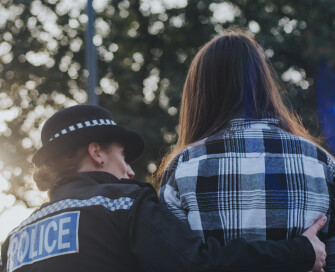Modern slavery and human trafficking continue to be tackled in Norfolk
Foundations have been put in place to provide a Norfolk-wide approach to helping victims of human trafficking and modern-day slavery thanks to a scheme funded by the Office of the Police and Crime Commissioner for Norfolk (OPCCN).
The two-year pilot project was co-ordinated by the British Red Cross and saw the development of the Norfolk Anti-Slavery Network (NASN), which worked alongside partners to ensure best practice and shared learning.
The initiative - funded under the £450k Hidden Victims’ Fund launched by OPCCN in 2019 - ran from September 2019 to August 2022.
The Red Cross received £66,155 under the fund after the OPCCN identified a need for additional provision to complement existing networks, for a co-ordinated and strategic response by partner organisations to recognise and support victims.
The NASN’s strategy had five overall objectives:
- To identify, support, protect and empower victims of modern slavery and human trafficking (MSHT);
- To support local organisations who are tackling MSHT by ensuring the right skills, knowledge and processes are in place;
- To promote collaboration and joint working amongst partner organisations and community-based agencies;
- To increase reporting of suspected MSHT;
- To raise awareness of MSHT within the communities of Norfolk.
During the term of the project a number of key objectives were achieved, including:
- Introduction of an Anti-trafficking Network Co-ordinator (ATNC) for the county.
- Launch of a Modern Slavery Statement to highlight commitment to tackling MSHT in Norfolk.
- The launch of a new website offering extra support and assistance on where to find help as well as information for professionals and businesses.
- Provision of countywide resources and expertise for local stakeholders and councils.
- Presentations and training delivered to safeguarding leads in the county, first responders, businesses the housing sector and police officers.
- Creation of referral pathways for children and adults affected by MSHT.
- Establishment of a Victim Support Services group to explore resources and opportunities for joint-working.
The two-year project with the Red Cross has laid the foundations for further work in this area particularly in relation to victim support.
Norfolk’s Police and Crime Commissioner, Giles Orpen-Smellie, said: “Supporting victims and reducing vulnerability in Norfolk is a main priority for me as PCC and is also a core aim of my Police, Crime and Community Safety Plan.
“Partnership working is ultimately the key to ensuring victims get the right support and help they need to escape the impossible trap they can find themselves in.
“The work which has been undertaken by the Red Cross in the county to tackle modern slavery and human trafficking should be commended.
“The key is to maintain that momentum - together we can work to make a real difference.”
Help and support
If you have concerns that someone is being exploited, or suspect modern slavery, please call the national Modern Slavery 24 helpline on 08000 121 700.
Modern day slavery and human trafficking are crimes in which people are exploited for other people’s personal gain.
Modern slavery is a term used in the UK and elsewhere to describe forms of exploitation occurring in the present day, as opposed to historical forms of slavery. In the UK, human trafficking is considered a form of modern slavery.
Modern Slavery captures a whole range of types of exploitation where children, young people and adults are treated as commodities and exploited for criminal gain.
Human Trafficking is the movement of individuals with the aim of forced labour or exploitation.
Visit our Criminal Exploitation web page
Apply to become a Modern Slavery and Anti Trafficking Coordinator
